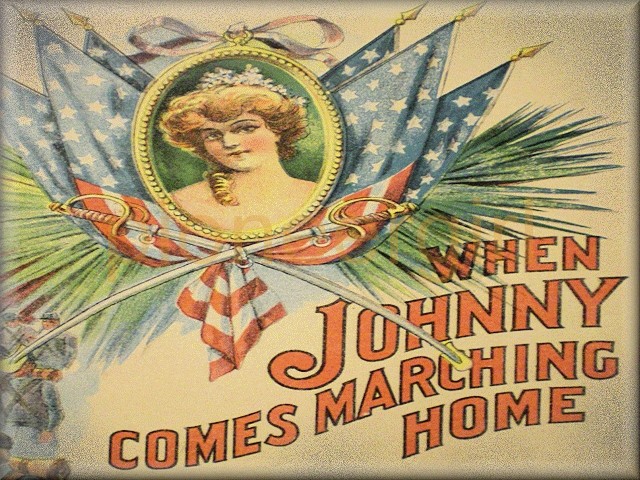“When Johnny Comes Marching Home”

 After supper, when night and lamplight came, Pa took his fiddle out of the box and tuned it lovingly. – ‘I have missed this,’ he said, looking around at them all. Then he began to play… — On the Banks of Plum Creek, Chapter 30, “Going to Town”
After supper, when night and lamplight came, Pa took his fiddle out of the box and tuned it lovingly. – ‘I have missed this,’ he said, looking around at them all. Then he began to play… — On the Banks of Plum Creek, Chapter 30, “Going to Town”
 In his corner Jack suddenly made a glad sound, as if he understood her. He ran to the door. He stood up against the door, scratching and whining and waggling. Then Laura heard, faintly whistling through the wind, ‘When Johnny Comes Marching Home.’ — On the Banks of Plum Creek, Chapter 34, “Marks on the Slate”
In his corner Jack suddenly made a glad sound, as if he understood her. He ran to the door. He stood up against the door, scratching and whining and waggling. Then Laura heard, faintly whistling through the wind, ‘When Johnny Comes Marching Home.’ — On the Banks of Plum Creek, Chapter 34, “Marks on the Slate”
When Johnny Comes Marching Home was written by Patrick Gilmore and published in 1863 under a pseudonym, Louis Lambert. It was his sole claim to musical fame. Although Gilmore told listeners that the song was based on an old Negro Spiritual, it was a traditional Irish air titled “Johnny, We Hardly Knew Ye.”
Patrick Sarsfield Gilmore (1829-1892) was an American bandmaster. Born in Ireland, he came to America with his family in 1848 and settled in Boston, Massachusetts. Here, he founded “Gilmore’s Band,” which became known as the leading military and concert band of America. During the Civil War, Gilmore served with the 24th Massachusetts Volunteers. Once military bands were discharged from the field, Gilmore took charge of them and was appointed bandmaster general.
Gilmore organized two of the largest festivals known in music history: the National and International Peace Jubilees, held in 1869 and 1872. Thirty thousand singers, two thousand instrumentalists, famous composers, and the best military bands of Europe participated. In 1892, he was performing with Gilmore’s Band when he died suddenly. After his death, Patrick Gilmore was declared to be the “Father of Military Bands” for his work.
In On the Banks of Plum Creek, Laura Ingalls Wilder refers to the song both as “When Johnny Comes Marching Home” and “When Johnnie Comes Marching Home.” It is a song Pa plays when returning from the harvest fields and whistles after being lost in a blizzard on the way home from town. Wilder mentioned the song in her handwritten Pioneer Girl manuscript as played by Pa on the way back to Walnut Grove from Burr Oak. In the typed Pioneer Girl manuscripts, “When Johnny Comes Marching Home” is played in both the Big Woods and in Walnut Grove.
1. When Johnny comes marching home again, Hurrah, hurrah!
We’ll give him a hearty welcome then, Hurrah, hurrah!
The men will cheer, the boys will shout,
The ladies, they will all turn out,
[chorus] And we’ll all feel gay,
When Johnny comes marching home.
2. The old church bell will peal with joy, Hurrah, hurrah!
To welcome home our darling boy, Hurrah, hurrah!
The village lads and lassies say,
With roses they will strew the way,
[chorus] And we’ll all feel gay,
When Johnny comes marching home.
3. Get ready for the Jubilee, Hurrah, hurrah!
We’ll give the hero three times three; Hurrah, hurrah!
The laurel wreath is ready now,
To place upon his loyal brow.
[chorus] And we’ll all feel gay,
When Johnny comes marching home.
4. Let love and friendship on that day, Hurrah, hurrah!
Their choicest treasures then display; Hurrah, hurrah!
And let each one perform some part,
To fill with joy the warrior’s heart,
[chorus] And we’ll all feel gay,
When Johnny comes marching home.
CLICK HERE to listen.

“When Johnny Comes Marching Home” / “When Johnnie Comes Marching Home” (BPC 30, 34; PG)
“When Johnnie comes marching home again”





